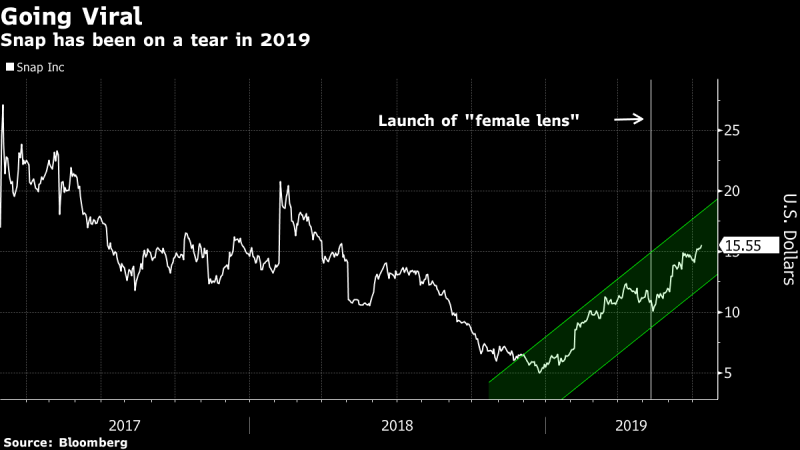

(Bloomberg) — It only took six months and a basket of disguises for Wall Street to love Snap Inc. again.
Snap has seen a dramatic recovery over the past several months, with shares more than tripling off a record low in December to trade at their highest level in more than a year. While there have been a number of tailwinds supporting the social-media company, one key ingredient behind the turnaround is this: it now allows users to “swap faces” with others in photographs, with “lenses” or filters that can, for example, make men look like women or babies.
Those who are unfamiliar with the latest viral sensations may view such a feature as an unusual foundation to build an investment on. But Wall Street sees the early-May launch of the filters as a key factor behind improving user trends at the Snapchat app, which is in turn leading to more optimistic projections for Snap’s top- and bottom-lines.
“The timing of the filter appears to have driven a notable increase in engagement,” wrote Mark Kelley, an analyst at Nomura Instinet.
In a report dated July 10, Kelly cited data from Sensor Tower that showed 67% growth in Snapchat app downloads in the second quarter. That represents a dramatic turnaround from the first quarter, when downloads fell 5% on a year-over-year basis. According to SimilarWeb data cited by Nomura, traffic to Snapchat.com was up 4% in the second quarter, compared with the first-quarter’s 24% decline.
“The jump is a positive nod to Snap’s efforts to spur engagement and demonstrates the platform’s scale and sway, particularly with millennials,” wrote Jitendra Waral, an analyst at Bloomberg Intelligence.
Snap will report second-quarter results on July 23. Analysts expect it to report an adjusted loss of 10 cents a share on revenue of $359.6 million. That represents revenue growth of 37% from a year ago. Analysts are also looking for 191 million daily active users in the quarter, compared with 190 million in the first quarter, according to data compiled by Bloomberg.
Wall Street’s expectations have been getting rosier, with MoffettNathanson writing that Snap was “on the verge of writing their own ‘Cinderella Story’.” Compared with six months ago, the consensus for Snap’s adjusted full-year loss has improved by about 25% while revenue expectations are up 5.4% over that period.
Bank of America on Thursday raised its revenue estimates on Snap for 2019 through 2021 and lifted its price target to $17 from $12. The firm expects user upside in the quarter, noting the “significant increase in download levels that started in May” after the filter was released.
The comments — which came just two days after Credit Suisse lifted its own target for similar reasons — contributed to the stock gaining as much as 4.5% on Thursday. Shares are trading at their highest level since April 2018, having more than tripled since December.
Beyond the engagement driven by the filter, Snap’s 2019 rally accelerated in February when its fourth-quarter results beat expectations and it pointed to a stabilizing user base. Additional gains came in April, when it announced a suite of new products and services, including a video-game business.
The gains have far outpaced Snap’s social-media rivals. Twitter Inc. is up more than 40% from its own December low, while Facebook Inc. — which dwarfs Snap in size and user base — is up more than 60% from December.
To contact the reporter on this story: Ryan Vlastelica in New York at [email protected]
To contact the editors responsible for this story: Catherine Larkin at [email protected], Scott Schnipper
<p class="canvas-atom canvas-text Mb(1.0em) Mb(0)–sm Mt(0.8em)–sm" type="text" content="For more articles like this, please visit us at bloomberg.com” data-reactid=”36″>For more articles like this, please visit us at bloomberg.com
©2019 Bloomberg L.P.












